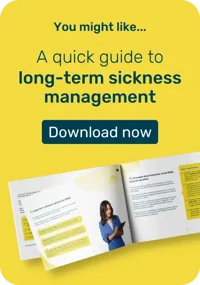Stress is no laughing matter – at its worst, it can lead to poor emotional wellbeing, health complications such as heart disease, or severe mental health problems.
As an employer, it’s crucial you’re able to spot the signs & know how to look after your employees, should they be suffering.
In this blog, we asked our HR Partner, Andy Phillpot, Managing Director of Businessynergy Limited for his professional advice on supporting employees who are off work due to stress.
What we know about stress
Research on wellbeing in the first edition of Breathe's People First Culture Series revealed that 47% of SME employees reported suffering from stress (in the 3-month survey period).
We know that if stress continues over a period of time, longer-term issues such as burnout can occur. If an employee is particularly burnt out, it may be necessary for them to take some time away from the office and re-charge their mental batteries. As their employer, it’s super important you know how to manage this to support your team member & ensure they make a full recovery.
We can see that stress is a major ongoing workplace issue. But what can SME employers do about it? In this blog, we'll cover how to tell when your employees are stressed & how to support an employee suffering from stress.
How can I tell if my employees are stressed?
Many of us feel stress at various points throughout our careers (and lives). But how might you spot stress signals if your employee isn't communicating how they're feeling?
Employees might fear retribution, consequences or being viewed as less than professional if they communicate how they're feeling. In this scenario, here are a few stress-related symptoms to keep an eye out for:
-
Loss of interest in work
-
Reduced quality of work
-
Loss of sense of humour
-
Decreased communication
-
Increased sickness absence
-
Difficulty concentrating
-
Poor time-keeping
-
Tiredness and irritability
-
Physical illness, e.g. nausea, headaches, aches & pains
How to prevent work-related stress
Preventing stress is always better than managing a crisis. While some pressure is part of working life, there are simple ways employers can take reasonable steps to reduce workplace stress and support mental health.
Here are a few ways to help prevent stress-related work absence:
Encourage openness
Let your team know it’s OK to speak up. Regular one-to-ones with their line manager can build trust and help spot early signs of stress.
Keep workloads realistic
Be mindful of deadlines and regularly review workloads. If someone’s under pressure, talk early to avoid burnout or longer-term health issues.
Offer flexibility
Small changes to hours or working patterns can make a big difference, especially for those juggling life outside work.
Lead by example
If you’re visibly stressed or skipping breaks, your team may feel pressure to do the same.
Promote proper breaks and time off
Make switching off the norm, not the exception. Burnout doesn’t help anyone.
A supportive culture helps prevent stress. It also shows your team you’ve got their back.
Understanding employee rights and employer responsibilities
If someone in your team is off with stress, here are a few helpful things to know:
-
Stress can increase the risk of developing mental or physical health conditions.
-
Statutory sick pay may apply
-
Employers have a duty of care
-
A stress risk assessment may be needed
-
Reasonable adjustments should be considered
-
Keep communication open
-
Seek professional advice if needed
Fit notes and stress-related absence: what employers need to know
If an employee is off work due to stress, the usual sick leave process applies, but there are a few things worth keeping in mind:
-
After 7 calendar days off, they’ll need a fit note from their GP
-
The fit note might include advice about reasonable adjustments or a phased return
-
They may be entitled to statutory sick pay, depending on eligibility
-
As a line manager, it’s helpful to stay in touch - a simple check-in can go a long way
-
Encourage the employee to seek professional medical advice and reassure them that their mental health is a priority
Keeping the process simple and supportive helps your employee feel cared for, and makes returning to work a little easier when the time’s right.
What to do when an employee is off sick with stress
According to research from Breathe's People First Culture Series, 12% of SME employees have taken sick leave specifically due to stress in the past 3 months (to April 2022).
If you have an employee off sick from work with stress, there are a number of steps employers can take to aid their recovery and ease them back into work.
The support that the employee receives during their time away is absolutely ‘make or break’ in terms of how quickly you’ll have them back in the office and working at optimum performance.
Taking a thoughtful approach when supporting a stressed employee can make all the difference to their recovery and long-term wellbeing.
So what do you need to do when an employee needs time off work for stress? Here are some helpful pointers.
Understand why they’re stressed
This needs to be done sensitively, in private and with compassion. Try to establish what it is that’s making your employee feel stressed. If there's anything that can be done to help minimise stress from a work perspective, try and take action sooner rather than later.
The employee may find it hard to talk about their mental health and how they’re feeling but assure them that you’re there to help and support them. It’s important that you’re patient and allow your staff member time to explain their situation.
Communication is key
Whilst it’s important to respect the employee’s wishes and give them the space they need to recover, a level of communication is also needed to ensure that both parties are in the loop.
It’s a good idea to check in on the employee every now and then to see how they’re doing, gauge whether there’s anything else you can be doing to support them and get an idea of when they may be returning to work.
It’s also helpful for the employee to know of any updates that concern them within the business; this can help avoid a feeling of isolation during their leave and will also help prepare them for when they return.
Carry out a return-to-work interview
When the staff member is eventually ready to return to work, it’s important you put some time aside to catch up, welcome them back and make your own judgement as to whether they're ready to return. It’s also a good opportunity to remind them of how much you value them as an employee and of their importance to the business.
We asked Breathe HR Partner, Andy Phillpot, Managing Director of Businessynergy Limited for his expert advice in this situation:
"Legally, an employer is under a duty to ensure the health, safety and welfare of their workforce - which includes mental wellbeing. Legal compliance should not be ignored, particularly in the case of an employee returning to work after an absence with stress.
It's as important to recognise that returning to work can be in itself a stressful situation for an employee. The support of the employer needs to be tailored to the particular circumstances, but may include practical steps such as doctor or occupational health referral for professional medical advice."
Andy Phillpot, Managing Director of Businessynergy Limited
You should use this time to establish how they’re feeling now and if there’s anything you can be doing at your end to make their return to work easier for them.
Make reasonable adjustments
Once you're aware that an employee is off sick with work-related stress, you have a duty of care as an employer to carry out a risk assessment and consider making reasonable adjustments.
Consider changes to working arrangements to help your employee get back to work quickly. Perhaps later starts, flexible working or reduced hours for a period could help.
Breathe's People First Culture Series research reveals that a huge 59% of SME employees feel less stressed when working from home.
A reduction in responsibilities for a period of time may also help your employee to feel less overwhelmed.
Wellbeing support
Have you considered wellbeing days for your organisation as a whole? Taking time to prioritise the mental health of your team is always time well spent. 35% of SME employees surveyed for Culture Series research said that their company doesn't currently offer wellbeing days, but they feel such a scheme would be helpful.
Wellbeing teams within organisations can offer support to fellow colleagues, along with ideas to support mental health. Having a dedicated team also keeps wellbeing firmly in the organisation's focus.
"Honest and emphatic discussions around any work situations that may have contributed to the initial problem are important. Explore adjustments that can be made to try and prevent any recurrence of the issues for the employee.
You might also reach an agreement with the employee on the way forward, which could include a phased return, a temporary change to working hours and investigating any 'red flags' that might signal a future problem."
Andy Phillpot, Managing Director of Businessynergy Limited
When dealing with supporting an employee off sick with stress, try and find ways to ease the pressure. Work with your team member to plan out how they might get back to work in an environment where they feel supported. The ways in which you do this will become clear after you have the initial conversation with the employee and understand why they’re suffering from stress.
Breathe's easy-to-use HR software allows you to track progress & recognise your people for the work they do. Why not trial for free today?
Andy Phillpot is the Managing Director of Businessynergy Limited, who are HR Partners of Breathe. Find out more about receiving HR support or joining our Partner programme.
.webp)
Author: Sarah Benstead
Sarah is a Product Marketing Specialist here at Breathe. Always innovating, she loves writing about product releases in an engaging & informative way. When she's not coming up with new ideas, she enjoys long walks with her dog, Clifford.





